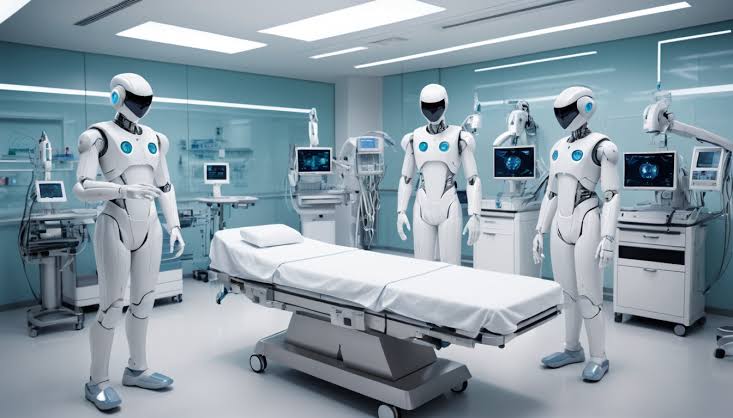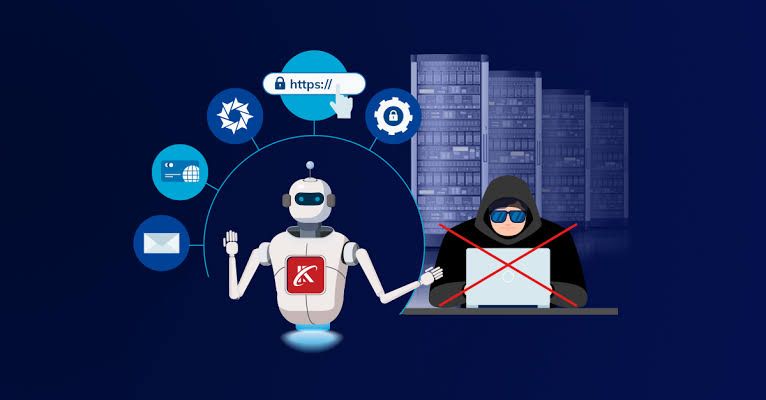
How Artificial Intelligence and Smart Technology Are Transforming Patient Care
Artificial intelligence and smart technologies are revolutionizing patient care by enabling faster diagnoses, personalized treatments, and proactive monitoring. From wearable devices and chatbots to robotics and predictive analytics, these innovations improve efficiency, safety, and patient outcomes. Remote healthcare, early disease detection, and AI-driven research are transforming the medical landscape.
✨ Raghav Jain

Introduction
Healthcare has always been a field of innovation, but in recent years, artificial intelligence (AI) and smart technology have revolutionized how patients are diagnosed, treated, and monitored. From wearable devices to predictive algorithms, technology is transforming the patient experience and enabling healthcare providers to deliver faster, more accurate, and personalized care.
While some fear that technology may replace human touch in medicine, the reality is that AI and smart devices complement medical professionals, improving efficiency and enhancing outcomes. By understanding the role of these innovations, patients and caregivers can harness them to ensure better health management, earlier interventions, and improved quality of life.
This article explores how AI and smart technology are reshaping patient care, the science behind these changes, practical applications, daily habits for leveraging these tools, and common misconceptions debunked. Artificial Intelligence (AI) and smart technology are transforming the landscape of healthcare, redefining how patient care is delivered, monitored, and managed. Over the past decade, these innovations have moved beyond the realm of futuristic speculation to become practical tools that improve patient outcomes, enhance efficiency, and reduce the burden on healthcare systems. By integrating AI algorithms, wearable devices, robotics, and data analytics into clinical practice, healthcare providers are now able to deliver personalized, precise, and timely care in ways that were previously unimaginable.
One of the most significant contributions of AI to patient care is its ability to process and analyze vast amounts of medical data quickly and accurately. Electronic health records, medical imaging, lab reports, and genetic data contain enormous volumes of information that are difficult for human clinicians to interpret efficiently. AI-powered systems can detect patterns, anomalies, and correlations within this data, providing early warnings for conditions such as cancer, cardiovascular disease, or neurological disorders. For instance, AI algorithms in radiology can analyze imaging scans to identify tumors at an early stage, often with higher accuracy than human radiologists. This early detection allows for prompt intervention, increasing the likelihood of successful treatment and improving patient survival rates.
Beyond diagnostics, AI is enhancing decision-making in clinical settings. Machine learning models can predict patient outcomes based on historical data, helping doctors select the most effective treatments tailored to individual patients. These predictive tools can assess the risk of complications, suggest optimal drug dosages, and even forecast hospital readmissions, allowing healthcare providers to adopt preventive measures. For patients with chronic conditions, AI systems can provide continuous monitoring and real-time alerts, enabling timely adjustments to care plans and minimizing the risk of acute episodes. In essence, AI acts as a powerful assistant to clinicians, augmenting their judgment with data-driven insights.
Smart technology extends beyond AI to include wearable devices, sensors, and mobile health applications that empower patients to take an active role in their healthcare. Wearables such as smartwatches, glucose monitors, and heart rate sensors continuously collect health metrics, allowing patients and providers to monitor vital signs in real time. These devices can detect irregular heart rhythms, track blood sugar fluctuations, and monitor sleep patterns, providing actionable insights for managing conditions like diabetes, hypertension, and sleep disorders. This continuous monitoring facilitates proactive care, reducing emergency visits and hospitalizations, while also giving patients greater control over their health.
Telemedicine and remote patient monitoring are other areas where smart technology is revolutionizing patient care. Telehealth platforms leverage AI and connectivity to offer virtual consultations, diagnosis, and follow-up care, breaking down geographical barriers and expanding access to medical expertise. Patients in rural or underserved areas can now receive timely consultations from specialists without the need for travel. Remote monitoring devices, integrated with AI analytics, can alert healthcare teams to concerning trends, enabling interventions before a patient’s condition worsens. This shift not only improves access but also enhances the efficiency of healthcare delivery, reducing strain on hospitals and clinics.
Robotics, another facet of smart technology, is also transforming patient care in both surgical and non-surgical contexts. Robotic-assisted surgery enables surgeons to perform complex procedures with greater precision, smaller incisions, and reduced recovery times. These systems can translate a surgeon’s hand movements into finely controlled motions, minimizing the risk of complications and improving patient outcomes. In addition, robotic devices are used for rehabilitation, assisting patients with physical therapy exercises, supporting mobility, and enhancing recovery for those with neurological injuries or musculoskeletal conditions. These applications highlight how technology can complement human expertise to achieve superior results.
AI and smart technology also have significant implications for personalized medicine. By analyzing genetic, lifestyle, and environmental data, AI can help design individualized treatment plans that optimize efficacy and minimize adverse effects. Pharmacogenomics, which studies how genes affect a person’s response to drugs, benefits from AI’s ability to process complex datasets, enabling tailored therapies that enhance patient safety and effectiveness. Personalized medicine extends beyond treatment to prevention, as predictive algorithms can identify individuals at high risk for certain diseases, prompting early lifestyle interventions and screenings that reduce long-term healthcare costs.
Despite these advancements, the integration of AI and smart technology into patient care also presents challenges. Data privacy, cybersecurity, and ethical considerations must be addressed to ensure that sensitive patient information is protected. The reliance on algorithms also raises concerns about bias, as AI systems trained on incomplete or unrepresentative datasets may produce inaccurate recommendations. Healthcare providers must strike a balance between leveraging technological capabilities and maintaining human oversight, ensuring that patient care remains compassionate, ethical, and equitable. Continuous training, regulation, and collaboration between technologists and clinicians are essential to maximize the benefits while mitigating risks.
The impact of AI and smart technology on patient care is already evident, with improvements in diagnosis, treatment planning, monitoring, and patient engagement. These tools are not intended to replace healthcare professionals but to enhance their abilities, enabling more informed decisions, efficient workflows, and better outcomes. As technology continues to evolve, its integration into healthcare systems will become deeper and more seamless, fostering a patient-centered model of care that is proactive, precise, and personalized. Patients can expect a future where medical interventions are faster, safer, and more responsive, and healthcare professionals can focus more on complex decision-making, empathy, and human interaction.
In conclusion, the fusion of artificial intelligence and smart technology represents a transformative force in modern healthcare. By harnessing data, predictive analytics, robotics, and wearable devices, patient care is becoming more efficient, personalized, and accessible. While challenges related to ethics, privacy, and bias remain, ongoing advancements promise to reshape the healthcare landscape profoundly. AI and smart technology are not just tools but partners in a collaborative approach to medicine, enabling clinicians to provide better care, empowering patients to manage their health proactively, and paving the way for a healthier and more informed society. The integration of these innovations signals a new era in patient care—one defined by intelligence, precision, and compassion.
Understanding AI and Smart Technology in Healthcare
Artificial intelligence refers to computer systems designed to perform tasks that typically require human intelligence. This includes analyzing complex medical data, recognizing patterns, and predicting outcomes. Smart technology refers to connected devices—wearables, sensors, apps, and robotics—that collect real-time health data and provide actionable insights.
Key components include:
- Machine Learning (ML): Algorithms that learn from historical medical data to predict disease risk or suggest treatments.
- Natural Language Processing (NLP): Enables AI to read and understand medical records, lab results, and patient histories.
- Wearables and IoT Devices: Smartwatches, fitness trackers, glucose monitors, and blood pressure cuffs provide continuous monitoring.
- Robotics and Telemedicine: AI-driven robots assist surgeries, rehabilitation, and remote consultations.
Good patient care in the AI era means faster diagnosis, personalized treatment plans, continuous monitoring, and predictive insights—ultimately leading to better health outcomes and patient satisfaction.
How AI Improves Patient Care
1. Early Diagnosis and Risk Prediction
AI algorithms can analyze medical images, lab results, and patient histories to detect illnesses at early stages. For example:
- Detecting cancer from MRI or CT scans more accurately than traditional methods
- Predicting heart attacks or strokes based on patterns in vital signs and lab reports
Early detection saves lives and allows timely interventions.
2. Personalized Treatment Plans
AI considers a patient’s genetic makeup, medical history, lifestyle, and even diet to create customized treatment plans. Personalized medicine improves drug efficacy and minimizes side effects.
3. Predictive Analytics for Chronic Conditions
AI can predict flare-ups in chronic illnesses like diabetes, asthma, or heart disease, enabling proactive care. Patients can adjust medications, diets, or activity levels before complications arise.
4. Administrative Efficiency
AI-powered software manages appointments, patient records, insurance claims, and follow-ups—reducing errors and freeing doctors to focus on patient interaction.
5. Enhanced Imaging and Diagnostics
AI helps radiologists and pathologists identify subtle anomalies in scans or biopsies that might be missed by the human eye. This precision accelerates diagnosis and treatment.
How Smart Technology Supports Patient Care
1. Wearable Health Devices
- Smartwatches, fitness trackers, and ECG monitors track heart rate, sleep, blood pressure, oxygen levels, and activity.
- Patients and doctors receive real-time alerts for abnormal readings, helping prevent emergencies.
2. Telemedicine and Remote Monitoring
- Video consultations, AI chatbots, and mobile apps allow patients to consult doctors from home.
- Remote monitoring ensures patients with chronic diseases get timely intervention without hospital visits.
3. Medication Management
- Smart pill dispensers and reminder apps reduce missed doses and prevent overdosing.
- AI monitors adherence patterns and sends alerts to both patients and caregivers.
4. Rehabilitation and Therapy
- Robotic-assisted physiotherapy helps patients recover faster with precise, repeatable movements.
- Smart devices track progress and adjust exercise plans in real-time.
5. Enhanced Patient Engagement
- AI-powered apps provide educational content, mental health support, diet guidance, and exercise tracking.
- Patients are more informed and proactive about their health.
AI + Smart Technology: The Perfect Duo in Patient Care
Combining AI with smart devices maximizes benefits:
- Real-Time Insights: Wearables collect data while AI analyzes trends to flag issues early.
- Continuous Learning: Machine learning models improve over time, creating better predictive accuracy for each patient.
- Remote, Personalized Care: Doctors can monitor multiple patients efficiently, reducing hospital overcrowding.
- Enhanced Safety: Automated alerts prevent medication errors, falls, or abnormal vitals.
- Reduced Healthcare Costs: Preventive care reduces hospital visits, tests, and emergency interventions.
Daily Practices to Use AI and Smart Technology Effectively
Morning Routine:
- Wear a smartwatch or fitness tracker to monitor sleep quality and heart rate.
- Check AI-powered health apps for personalized reminders: hydration, medication, or exercise.
- Use guided meditation or stress-monitoring apps to start the day calmly.
Midday Routine:
- Log meals in nutrition apps linked to AI to track macros and health metrics.
- Attend virtual consultations if needed—avoid unnecessary hospital visits.
- Take short activity breaks guided by smart devices to maintain circulation.
Evening Routine:
- Review daily vitals from wearable devices.
- Use AI-powered apps for sleep tracking and relaxation exercises.
- Reflect on AI-suggested lifestyle improvements: diet changes, exercise adjustments, or stress management techniques.
Weekly Habits:
- Sync devices with doctors or healthcare portals.
- Update medical records on AI platforms.
- Experiment with one new AI-guided activity or app feature for improved health tracking.
Common Challenges and How to Overcome Them
Challenge 1: Data Privacy Concerns
- Ensure devices and apps are HIPAA-compliant or follow local health data regulations.
- Use strong passwords and secure Wi-Fi for health data.
Challenge 2: Technology Dependence
- AI supports decisions but doesn’t replace medical judgment.
- Use tech as a tool, not a crutch.
Challenge 3: Cost Barriers
- Start with affordable wearables or apps.
- Free AI health tools and telemedicine options are widely available.
Challenge 4: Misinterpretation of Data
- Always consult a healthcare professional before acting on AI alerts or app recommendations.
Myths About AI in Patient Care: Busted!
“AI will replace doctors.”
→ False. AI assists doctors, reduces errors, and speeds up processes, but human judgment and empathy are irreplaceable.
“Smart technology is only for tech-savvy patients.”
→ Wrong. User-friendly apps, voice assistants, and wearable devices are accessible for all age groups.
“AI can diagnose without context.”
→ Not true. AI requires accurate data and interpretation alongside a medical professional.
“Wearables are just fitness gadgets, not medical tools.”
→ Modern wearables provide medically relevant data like ECG, oxygen levels, and heart rhythm monitoring.
Future of Patient Care with AI and Smart Technology
- Predictive Medicine: AI will forecast disease outbreaks and personal health risks.
- Virtual Health Assistants: Chatbots will provide 24/7 guidance and follow-up.
- Surgical Robotics: Robots will perform precise surgeries with minimal invasiveness.
- Personalized Drug Development: AI will design medications for individual genetic profiles.
- Global Health Integration: Smart tech will connect rural and urban healthcare systems, improving access worldwide.
Conclusion
Artificial intelligence and smart technology are no longer futuristic concepts—they are actively transforming patient care today. By enabling early diagnosis, personalized treatment, continuous monitoring, and efficient healthcare delivery, AI and smart devices are empowering patients and doctors alike.
The key is to embrace technology mindfully, combining it with regular check-ups, human care, and lifestyle improvements. Even simple daily habits like wearing a smart tracker, using AI apps for medication reminders, or attending virtual consultations can significantly improve health outcomes.
Technology is not a replacement for care—it is an enhancement. Patients who leverage AI and smart devices enjoy better health insights, faster interventions, and an empowered approach to wellness.
Start integrating AI and smart technology into your health routine today. Your future self—and your doctor—will thank you.
Q&A Section
Q1:- What is Artificial Intelligence in healthcare and how does it improve patient care?
Ans :- AI in healthcare uses machine learning and data analytics to assist in diagnosis, treatment planning, and predictive care, making healthcare faster, more accurate, and personalized.
Q2:- How are smart technologies like wearable devices impacting patient monitoring?
Ans :- Wearables track vital signs, physical activity, and sleep patterns in real-time, alerting patients and doctors to potential health issues early.
Q3:- What role does AI play in early disease detection?
Ans :- AI algorithms analyze medical images, lab results, and patient history to identify diseases like cancer or heart conditions earlier than traditional methods.
Q4:- How do chatbots and virtual assistants improve patient communication?
Ans :- AI-powered chatbots answer queries, schedule appointments, provide medication reminders, and offer guidance, reducing patient wait times and enhancing engagement.
Q5:- How is predictive analytics transforming hospital management?
Ans :- AI predicts patient admissions, resource needs, and potential complications, helping hospitals optimize staffing, reduce costs, and improve outcomes.
Q6:- What is the role of robotics in patient care and surgery?
Ans :- Smart robotic systems assist in precise surgeries, rehabilitation, and repetitive tasks, minimizing human error and speeding up recovery.
Q7:- How are AI and IoT devices enhancing home healthcare?
Ans :- Connected devices monitor patients remotely, alert caregivers to emergencies, and support elderly or chronically ill patients living independently.
Q8:- How does AI personalize treatment plans for patients?
Ans :- AI analyzes genetic data, lifestyle, and medical history to recommend individualized therapies and medications, increasing effectiveness and minimizing side effects.
Q9:- What impact does AI have on medical research and drug development?
Ans :- AI accelerates research by simulating drug interactions, identifying potential candidates, and predicting outcomes, reducing development time and cost.
Q10:- What challenges exist in implementing AI and smart technology in healthcare?
Ans :- Challenges include data privacy, high costs, integration with existing systems, and the need for ethical oversight and staff training.
Similar Articles
Find more relatable content in similar Articles

Solar-Powered Wearables: Can T..
Solar-powered wearables are re.. Read More

AI in Drug Discovery: Faster C..
Artificial Intelligence is rev.. Read More

AI-Powered Hackers: The New Cy..
In 2025, cyber threats have en.. Read More

Smart Cities: How Technology I..
Smart cities are transforming .. Read More
Explore Other Categories
Explore many different categories of articles ranging from Gadgets to Security
Smart Devices, Gear & Innovations
Discover in-depth reviews, hands-on experiences, and expert insights on the newest gadgets—from smartphones to smartwatches, headphones, wearables, and everything in between. Stay ahead with the latest in tech gear
Apps That Power Your World
Explore essential mobile and desktop applications across all platforms. From productivity boosters to creative tools, we cover updates, recommendations, and how-tos to make your digital life easier and more efficient.
Tomorrow's Technology, Today's Insights
Dive into the world of emerging technologies, AI breakthroughs, space tech, robotics, and innovations shaping the future. Stay informed on what's next in the evolution of science and technology.
Protecting You in a Digital Age
Learn how to secure your data, protect your privacy, and understand the latest in online threats. We break down complex cybersecurity topics into practical advice for everyday users and professionals alike.
© 2025 Copyrights by rTechnology. All Rights Reserved.